Research
Crisis in Iraq: A View From the Ground
Jun. 18, 2014
This map illustrates ethnic composition by province, according to Iraqi Futures data collected from 2012 to 2014. Provinces are color coded to indicate areas where the population is 75% or more Kurdish, Shia Arab, Sunni Arab, or a mixture of ethno-sectarian groups. Figures above also illustrate the mixed ethnic composition of provinces in northern Iraq (Nineveh, Tamim, and Diyala), where ISIS groups have recently taken control.
McLean, VA, June 18th, 2014 — In the last week the Sunni militant movement Islamic State in Iraq and Syria (ISIS) has made a dramatic push to take control of Mosul and other areas of northern Iraq. Seizing the opportunity provided by the Iraqi Army’s disintegration in the north, Kurdish peshmerga forces have seized the city of Kirkuk, fulfilling a long-standing ambition of the Kurds to control this strategic location. In response to ISIS threats to attack the holy cities of Najaf and Karbala, Grand Ayatollah Ali al-Sistani and other Iraqi Shia clerics have called upon all Iraqis to take up arms and support the Iraqi Security Forces efforts to repel ISIS’s advance on Baghdad. D3 Systems, a full-service international research firm based in McLean, VA, has conducted surveys in Iraq since 2003. Since July 2012, D3 has commissioned Iraqi Futures, a periodic survey of Iraqis in all 18 provinces of the country. These data provide insights into Iraqi views on issues that underlie the current crisis in the country. Amid discussions of possible courses of action to respond to the crisis, it is important to highlight that the ultimate resolution of the underlying problems lies with the Iraqi government and the Iraqi people. To this end we offer an examination of the data from almost 20,000 interviews with Iraqis between July 2012 and May 2014. The data consistently reveals substantial differences in the perceptions of the three major ethno-sectarian groups (Kurds, Shia Arabs and Sunni Arabs). Where data is available from multiple surveys, we present a percent range and the months in which the data was collected. When the data is derived from one survey, we specify the percent and the month.
The General Environment
Iraqis as a whole have long said that the country is headed in the wrong direction (73-62%, July 2012-May 2014). Sunni Arab respondents consistently express more negative views about the direction of the country compared to Shia Arabs and Kurds (83-94% “wrong direction” among Sunni Arabs compared to 56-70% among Kurds and 50-66% among Shia Arabs from July 2012 to May 2014).
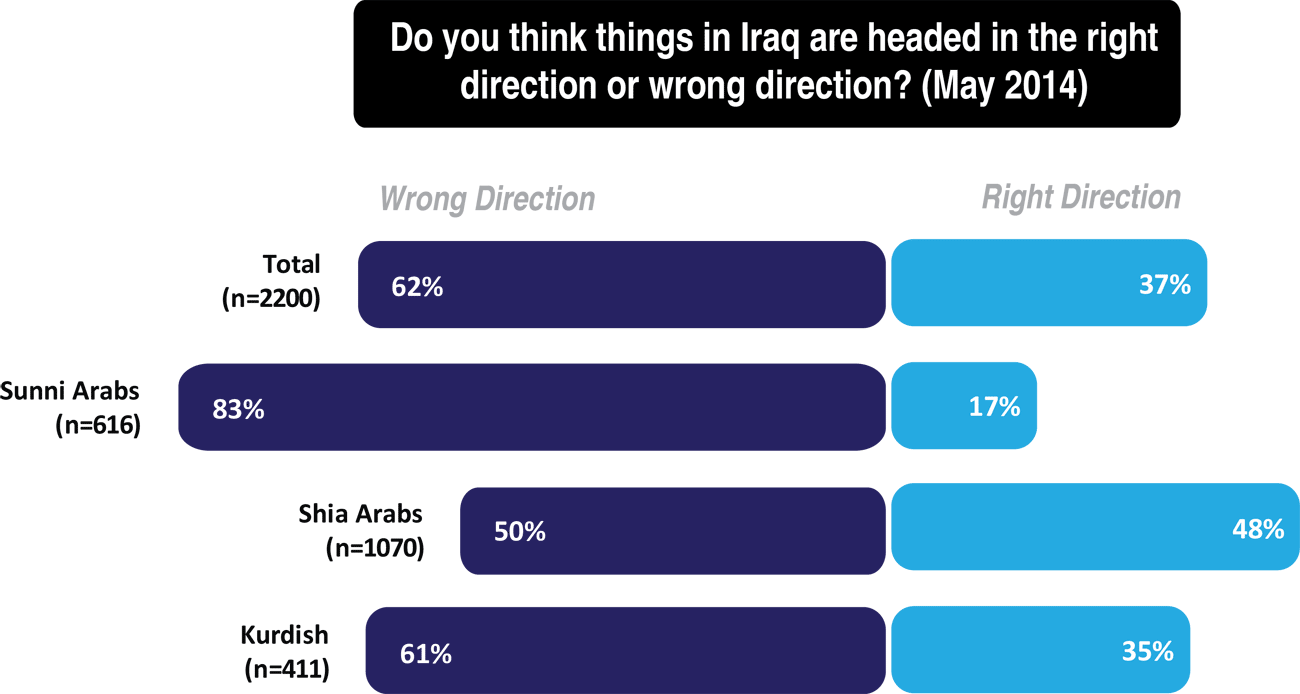
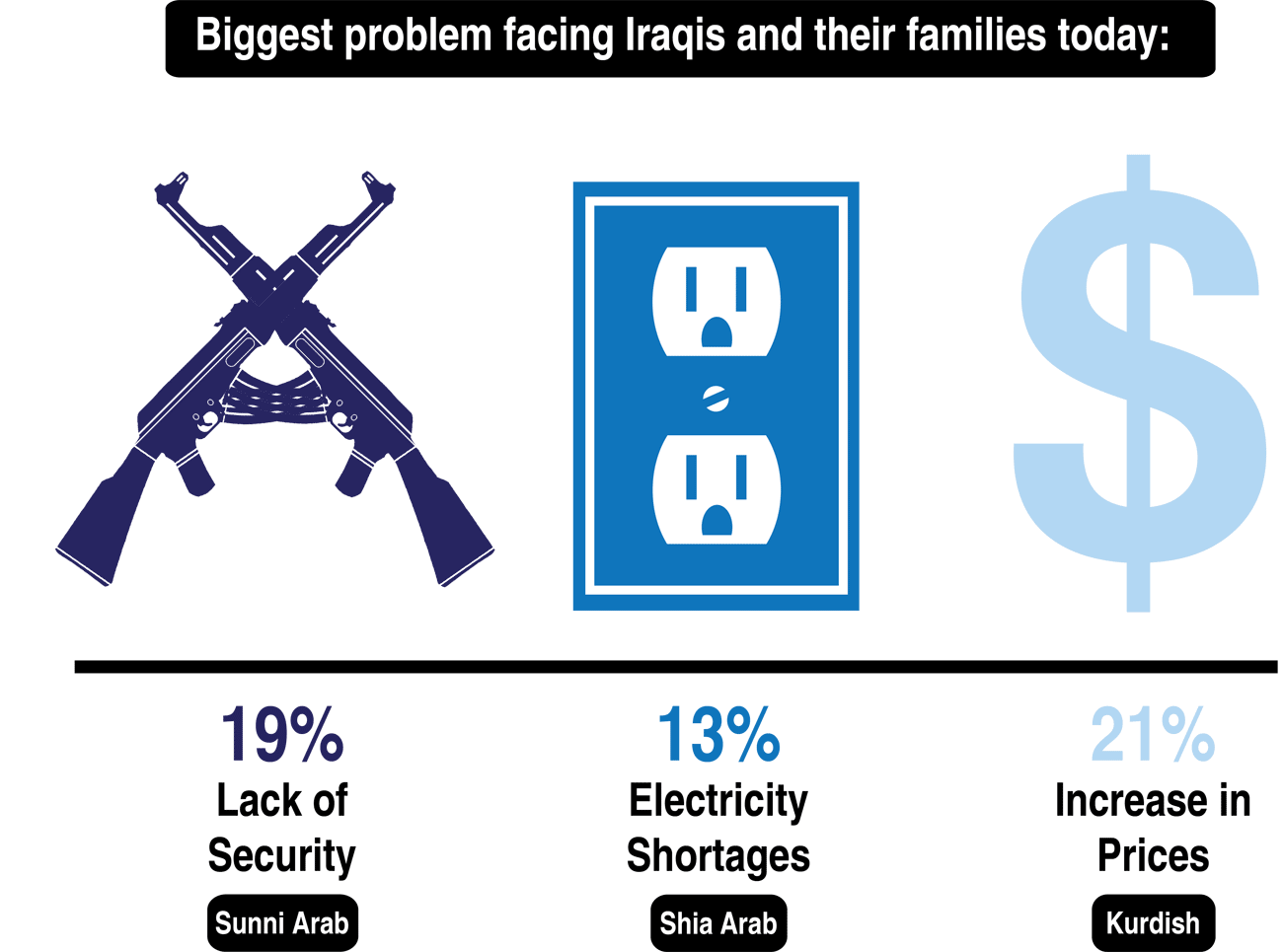
Negative perceptions of the Iraqi government’s legitimacy and its ability to perform the key functions of maintaining law and order and providing services feed into general dissatisfaction with the al-Maliki government, especially amongst Sunni Arabs. Popular disaffection is a wedge between the Sunni Arab population and the Shia-dominated Iraqi government that insurgent groups like ISIS can leverage to achieve their goals. The data from July 2012 to May 2014 clearly indicate divisions in views of the government along ethno-sectarian lines.
Based on May 2014 data, Kurds are most likely to say they are satisfied with how democracy is working in Iraq (63%), compared to 46% of Shia Arabs and only 15% of Sunni Arabs. Such dissatisfaction with democracy helps explain Sunni Arabs’ disillusionment with the government’s legitimacy. Two thirds of Sunni Arabs (66%) believe the decisions made by the Iraqi government are illegitimate and may be ignored by Iraqis, while 68% of Shia Arabs believe decisions made by the government are legitimate and thus binding on Iraqis.

In August 2013-January 2014, respondents were asked about their level of confidence in the next government’s ability to perform key functions. The majority of Iraqi respondents say they have either “not very much confidence” or “no confidence at all” in the next government’s ability to: maintain law and order (66%), provide essential services (68%), manage the economy (71%), and fight corruption (80%). Not surprisingly, Sunni Arabs report the lowest levels of confidence compared to Shia Arabs and Kurds.
Crisis in Anbar: Prelude to Mosul
In addition to measuring public perceptions of living conditions and government institutions, D3 has tracked opinions about political and security crises over the past two years. In February 2013, respondents were asked if the arrest warrant issued for Vice President Tariq al-Hashemi in December 2011 and the arrest of Finance Minister Rafi al-Issawi’s security guards in December 2012 was a sign of changes in political tensions between political leaders. Almost three quarters of Sunni Arabs (74%) said these actions are a sign of increasing tensions, as did 72% of Kurds compared to 56% of Shia Arabs.
The raid on Finance Minister Rafi al-Issawi’s home and the arrest of his bodyguards triggered long-running protests against what many Sunni Arab leaders consider to be al-Maliki’s abuse of anti-terrorism laws for political purposes. Protests in Fallujah intensified in December 2013 after a raid to arrest Ahmed al-Alwani, a Sunni Arab parliamentarian, killed al-Alwani’s brother and 5 guards. The protests spread throughout Anbar and to neighboring provinces. In an attempt to calm the situation, Prime Minister al-Maliki withdrew Iraq army forces from Anbar province. In the absence of government security forces, ISIS fighters, who had built up a presence in the year of unrest amidst the protests, sought to exert control prompting the Iraqi government to respond with force.[1] Fighting between ISIS insurgents and the Iraqi military ensued throughout January. Anbar tribal militias nominally assisted the Iraqi forces, asserting that they were fighting against al-Qaeda terrorists not for the Iraqi government.
Critics allege that al-Maliki has used the Al-Qaeda presence in western Iraqi provinces as an excuse to unfairly target Sunni Arabs. ISIS has been able to leverage this alienation to present an alternative that appeals to Sunni Arabs who feel alienated by the al-Maliki government. The siege of Fallujah that commenced in January 2014 can be seen as a prelude to the current crisis that has engulfed northern Iraq. Data from March 2014 regarding the crisis in Anbar show dramatic differences across ethno-sectarian groups with regards to how government bodies and leaders handled the Anbar crisis. Satisfaction among Sunni Arabs with how the Iraqi government, the Iraqi Army, and Prime Minister al-Maliki responded to the crisis in Anbar hovers around 11-14%. Two thirds (67%) of Shia Arabs on the other hand, say they are very or somewhat satisfied with how the Iraqi Army handled the crisis in Anbar; 40% are satisfied with the Iraqi government and 44% are satisfied with PM al-Maliki’s response.
The groups that make up the majority of the population in northern Iraq – Sunni Arabs and Kurds – expressed a different view relative to Shia Arabs of the likelihood that the situation in Anbar could spill over elsewhere in the country. In March 2014, similar percentages of Sunni Arabs (86%) and Kurds (81%) were concerned that events in Anbar province would spread across other Iraqi provinces. A smaller majority (62%) of Shia Arabs shared the same concern. Sunni Arabs and Kurds expressed similar concerns about the possibility that sectarian violence will increase across Iraq: 90% and 87% concerned, respectively, compared to 70% of Shia Arabs.
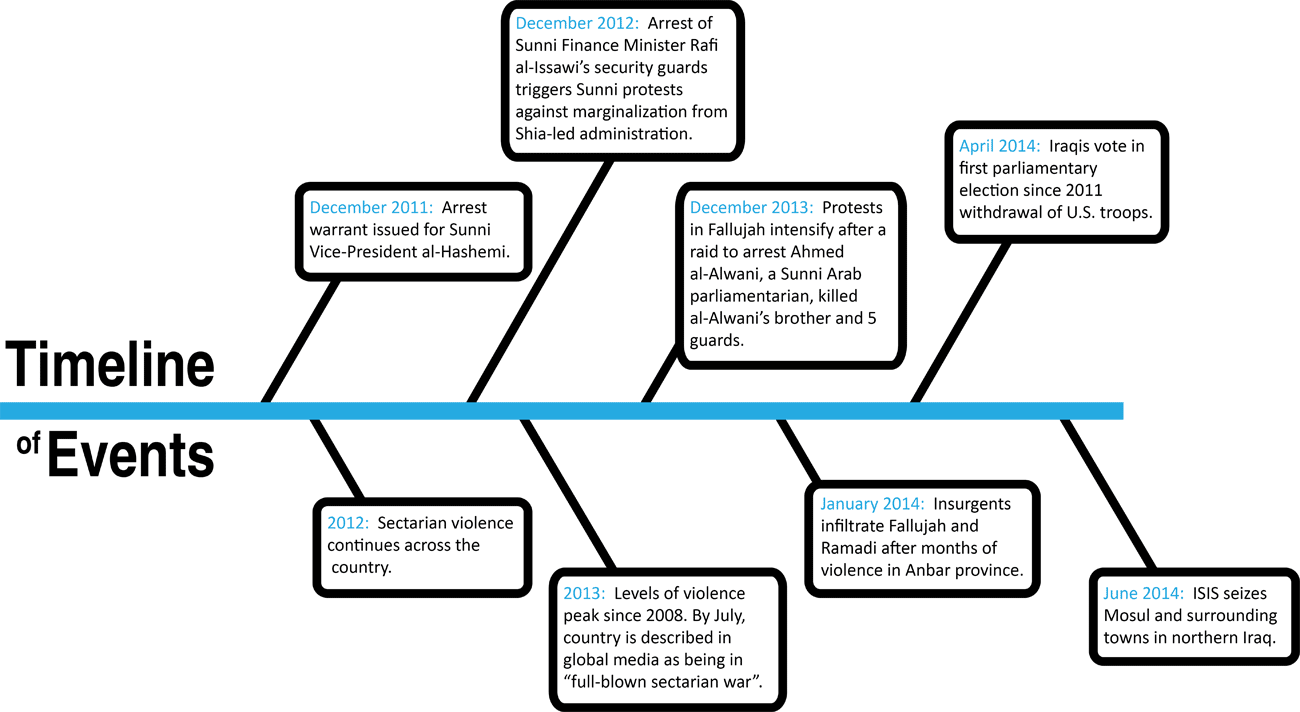
On top of a crisis in confidence in the Iraqi government, the data reveal sharp divisions along ethno-sectarian lines in terms of levels of support for the security forces of Iraq. These divisions speak to how ISIS was able to seize control of so much territory virtually unopposed, in spite of Iraqi security forces being trained and equipped by the United States. Few among the Sunni Arab majority express support for the government, and when faced with a determined opponent, Iraqi Army soldiers, especially Sunni Arab soldiers, have little motivation to stand and fight for a government they see as causing more harm than good.
Sunni Arabs are most likely to have unfavorable views of the Iraqi Army (83% in May 2014). Kurds also tend to have unfavorable views of the IA (55% unfavorable), whereas Shia Arabs have positive views of the military forces at 71% favorable (May 2014). Responses to the question of whether the ISF is doing a good job providing all of Iraq’s security expose a similar dichotomy: only among Shia Arabs do a majority (57%) agree; just 14% of Sunni Arabs and 38% of Kurds agree with this statement.
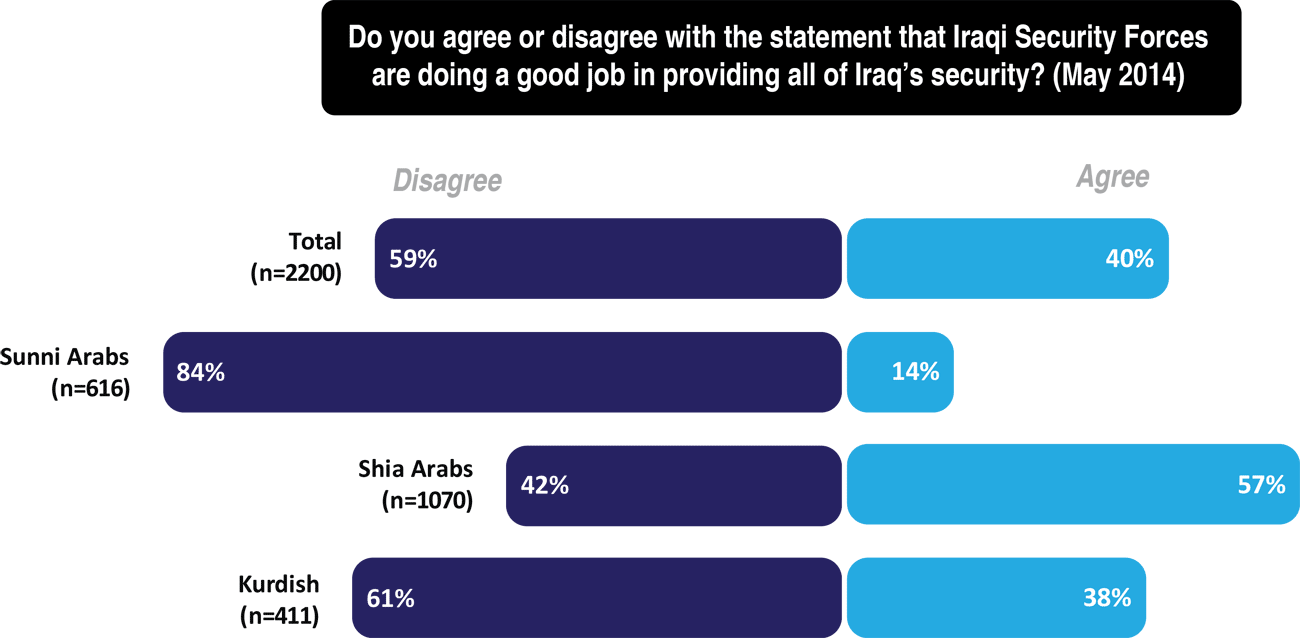
Implications for the Future
Various courses of action are being discussed by the United States and other governments that are concerned about the recent developments in Iraq. A long term solution to the issues that have given rise to the ongoing conflict between ethno-sectarian groups in Iraq will require substantial political compromise of a sort that has been lacking since 2003. Enduring stability depends on the formation of alliances across religious and ethnic lines and may even require a complete overhaul of the government structure. Such change seems unlikely at this juncture given the results of the recent parliamentary elections.
Beginning in August 2013, respondents were asked about the likelihood that a civil war will start in Iraq in the next year. Ethno-sectarian divides are evident in these data as well: in the May 2014 survey, Sunni Arabs (50%) are more likely than Kurds (41%) and Shia Arabs (33%) to believe a civil war is likely to start in Iraq in the near future. Notably, one in ten (10%) Sunni Arabs in May 2014 think that the country is already in the midst of a civil war versus 8% of Kurds and 4% of Shia Arabs. In November 2013, January 2014 and March 2014, 18-20% of Sunni Arab respondents expressed the belief that there was already a civil war in Iraq.
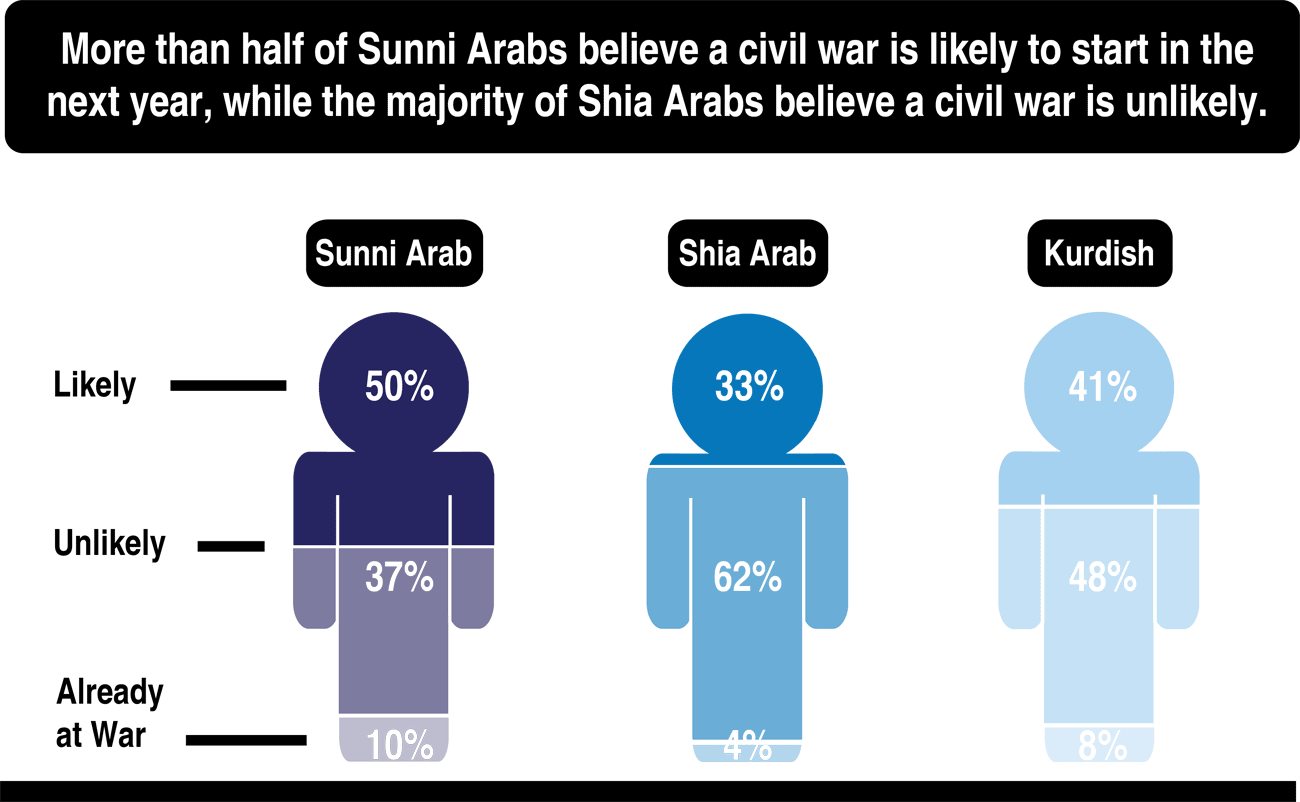
In March 2014, 69% of all respondents indicated that they were very or somewhat likely to vote. Kurdish respondents are more likely to vote (82%), followed by 70% of Shia Arabs and 57% of Sunni Arabs. In May 2014, 76% of Kurds, 70% of Shia Arabs and 58% of Sunni Arabs reported that they voted in the April parliamentary elections. The voting preferences respondents expressed in March and respondents’ reported voting behavior are presented in the table below alongside the results of the elections.
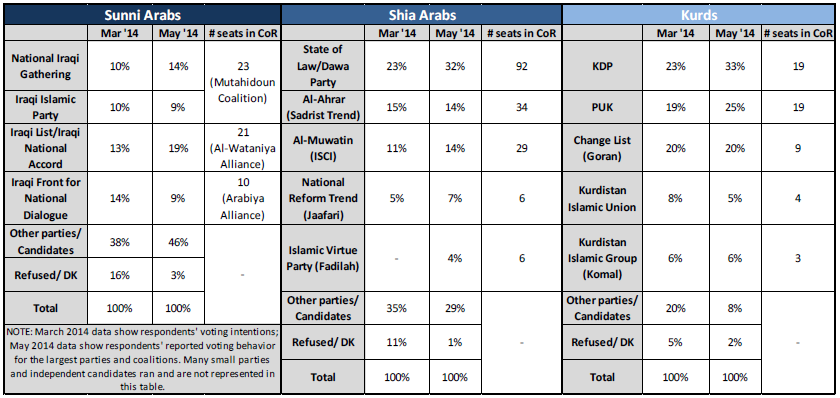
The election results, combined with the current security crisis, present an opportunity for compromise on one hand and the possibility of preserving the status quo on the other hand. The outcome puts al-Maliki in a strong position but 163 votes are needed from the 328 member Council of Representatives to form a government. Kurdish, Sunni Arab and Shia coalitions separate from the State of Law party, if sufficiently unified, could prevent al-Maliki from securing the necessary votes to remain Prime Minister. The ISIS seizure of territory, funds and weapons in Northern Iraq, and the looming danger of outright sectarian warfare might prompt the political parties to avoid building alliances across religious and ethnic lines and instead retreat within their ethno-sectarian blocs. The dynamics within the CoR are likely to reflect the conflicts that are currently raging throughout Iraq.
Methodology
KA Iraq and KA Belgium, in cooperation with D3 Systems, have conducted Iraqi Futures, a series of nine nationally representative face-to-face surveys, to gather data on public opinion, behaviors, and attitudes in Iraq from July 2012 to May 2014. Iraqi Futures contains 19,800 interviews total. The most recent survey was carried out by trained and experienced Iraqi interviewers and supervisors from May 7th to May 13th, 2014. The total sample size for the current survey is 2,200 adults, aged 18 years and older. This is a nationally-representative stratified multi-stage cluster probability sample of 2,000 individuals across eighteen provinces in Iraq, with an additional 200 Kurds surveyed through a probability sample across seven predominately Kurdish provinces in Northern Iraq. Results reported here are weighted to correct for the intentional over-sampling of Kurds. Assuming a simple random sample with n=2,200, p=.5, at the 95% CI level, the margin of error (MOE) for the survey is 2.1%. Accounting for the complex design through a design effect estimate of 2.6, with p=.5 at the 95% CI level, the complex margin of error is 3.4%.
For more information contact:
Alicia Boyd: alicia.boyd@d3systems.com or Nina Sabarre: nina.sabarre@d3systems.com